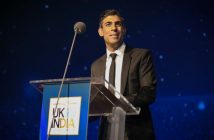Manoj Ladwa speaks to Anjalika Bardalai on market intelligence…
 1. You’ve worked in the US and UK, but your focus has been India. Why India?
1. You’ve worked in the US and UK, but your focus has been India. Why India?
I actually started my career looking more broadly at Asia, through the lens of financial systems in the wake of the 1997-98 Asian crisis. But I jumped at the chance to take on my current role — I moved back to London on less than a month’s notice! It’s relatively high-profile work because there is now so much interest in India’s economy, but the greatest reward for me is being able to study the nuances of one the world’s most complex, dynamic countries. I love looking at the intersection of politics, policy, and economics in a society that is undergoing as profound a transformation as India is.
2. You’re known as the ‘go to’ person when it comes to India market intelligence. Is that fair?
The EIU has an unparalleled (and well-deserved!) reputation for the quality of its analysis. But I think that my particular contribution is bringing a sense of balance and perspective to the issues affecting a dynamic, and sometimes, volatile part of the world. I spend a lot of time thinking about context. Lots of people can tell you that they expect GDP growth of 8-9 per cent in India, but I think my real value lies in tackling India’s complexity, but while always trying to keep the ‘bigger picture’ in mind.
3. What’s your big prediction for India in 2011?
My boldest prediction is probably that India will unfortunately fail to really capitalise on its so-called ‘demographic dividend’. Much is made of the fact that the proportion of working-age people to total population is still rising, but job creation is as much of a problem in some areas as labour shortages are in others. India’s strong growth fundamentals mean that the economy will prosper anyway, but that the potential for demographics to contribute to this growth will remain far greater than its actual contribution.
4. The Indian media is full of corruption stories. Do you think India will ever be able to clean up its act?
As incomes continue to rise and more people are able to satisfy more of their basic consumer desires, I think a lot of the petty corruption that is still so prevalent will diminish. But I don’t think corruption will disappear altogether. Some people, given the opportunity, will always try to enrich themselves even at the expense of others. And greed is universal, so it’s really worth emphasising that corruption exists in ALL countries, in one form or another, to greater or lesser degrees — just think of our own parliamentary expenses scandal, or the reports of US security contractors bribing officials in Iraq.
5. Is there one Indian business person you admire. If so, who and why?
Indian or not, I admire anyone who has the courage and the risk tolerance to go against the grain — particularly when the odds of success are long — and do something new, like start a new business. But in India, daring to break the mould is even more remarkable because the culture has traditionally been relatively risk-averse, discouraging entrepreneurship and innovation (though this is changing!) I am incredibly impressed by people who are helping to foster innovation in India. I met S.D. Shibulal last year, and I greatly admire not only his role in the amazing story that is Infosys, but also his incisive analysis of innovation in all its various forms.
Anjalika Bardalai is the Economist Intelligence Unit’s senior analyst covering South Asia. She leads the company’s political and economic analysis and forecasting for India and Pakistan, as well as for several smaller states on the sub-continent. A frequent commentator in the media, Anjalika has given numerous presentations to executives at major corporations, and has spoken at or chaired conferences on four continents.
She is also the manager of Country Reports, the Economist Intelligence Unit’s flagship report, and is responsible for producing Country by Country, the company’s annual forecasting guide. Prior to joining the company’s London headquarters, she worked in theNew Yorkoffice managing Country Finance, which covers financial institutions and financing methods in 45 countries.






